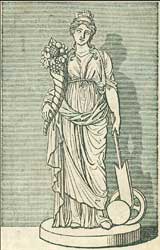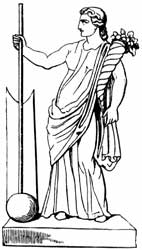Fortuna
The goddess of chance or good luck, was worshiped both in Greece and Italy, and more particularly at Rome, where she was considered as the steady goddess of good luck, success, and every kind of prosperity. The great confidence which the Romans placed in her is expressed in the story related by Plutarch,1 that on entering Rome she put off her wings and shoes, and threw away the globe, as she intended to take up her permanent abode among the Romans.

Her worship is traced to the reign of Ancus Martius and Servius Tullius, and the latter is said to have built two temples to her, the one in the Forum Boarium, and the other on the banks of the Tiber.2 The Romans mention her with a variety of surnames and epithets, as publica, privata, muliebris (said to have originated at the time when Coriolanus was prevented by the entreaties of the women from destroying Rome3), regina, conservatrix, primigenia, virilis, etc. Fortuna Virginensis was worshiped by newly married women, who dedicated their maiden garments and girdle in her temple.4 Ovid5 tells us that Foruna Virilis was worshiped by women, who prayed to her that she might preserve their charms, and thus enable them to please their husbands. Her surnames, in general, express either particular kinds of good luck or the persons or classes of persons to whom she granted it.

Her worship was of great importance also at Antium and Praeneste, where her sortes or oracles were very celebrated.
❧
Iconography
Fortuna is usually depicted in standing position and wearing regal clothing.
References
Notes
- On the Fortune of the Romans, 4.
- Plutarch, l.c., 5, 10; Dionysius, iv, 27; Livy. The History of Rome x, 46; Ovid. Fasti vi, 570.
- Plutarch, l.c.
- Arnobius, ii, 67; Augustine. City of God iv, 11.
- Fasti iv, 145.
Sources
- Dictionary of Antiquities, s.v. Oraculum.
- Hartung, J.A. Die Religion der Römer. Vol. 2, p. p. 233 ff.
- Smith, William. (1870). Dictionary of Greek and Roman Biography and Mythology. London: Taylor, Walton, and Maberly.
This article incorporates text from Dictionary of Greek and Roman Biography and Mythology (1870) by William Smith, which is in the public domain.